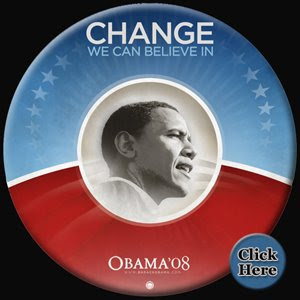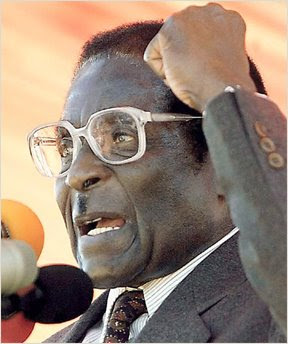
The facts represented here in Zimbabwe Travel, are true. The sources of these are published documents, eye-witness accounts, and my personal observations and experiences in Zimbabwe, Africa.
Saturday, October 04, 2008
Wednesday, August 20, 2008
Zimbabwe inflation hits 11,200,000 percent
 HARARE, Zimbabwe (CNN) -- Zimbabwe's inflation rate has soared in the past three months and is now at 11.2 million percent, the highest in the world, according to the country's Central Statistical Office.
HARARE, Zimbabwe (CNN) -- Zimbabwe's inflation rate has soared in the past three months and is now at 11.2 million percent, the highest in the world, according to the country's Central Statistical Office.Zimbabwe's inflation rate has soared to a world high.
Official figures dated Monday show inflation has surged from the rate of 2.2 million percent recorded in May, despite the government's price controls.
The country's finance minister confirmed the new figure in an interview but said the rising inflation rate was not confined to Zimbabwe alone.
"While our case has been aggravated by the illegal sanctions imposed by the Western powers, rising food prices are a world phenomenon because of the use of bio-fuel," said Samuel Mumbengegwi. "But we will continue to fight inflation by making sure that prices charged are realistic."
In February, the price of a loaf of bread in the country was less than 200,000 Zimbabwe dollars. On Monday, that same loaf of bread cost 1.6 trillion Zimbabwe dollars.
Analysts have said the Zimbabwean government's official inflation rate figures are conservative. Last week, one of Zimbabwe's leading banks, Kingdom Bank, said the country's inflation rate was now more than 20 million percent.
The locally-owned bank predicted tougher times ahead for Zimbabwe in the absence of donor support and foreign investment in an economy that has been in freefall for almost a decade.
Full article: CNN/world business
Tuesday, July 22, 2008
U.S. Pushes U.N. Sanctions on Zimbabwe and Mugabe
 By NEIL MacFARQUHAR
By NEIL MacFARQUHARPublished: July 4, 2008
UNITED NATIONS — Seeking to force President Robert Mugabe into negotiations with the opposition, the United States on Thursday formally proposed United Nations Security Council sanctions on Zimbabwe. The proposed sanctions include an international arms embargo and punitive measures against the 14 people the United States deemed most responsible for undermining Zimbabwe’s presidential election through violence.
Aside from Mr. Mugabe, those singled out in the draft resolution to be subject to an international travel ban and a freeze on personal assets include the chiefs of the various branches of the armed forces, the governor of the central bank, the head of the Justice Department and the presidential spokesman.
“We want to respond to the situation and respond in a way that encourages a move towards resolving the legitimacy crisis without negatively impacting the people of Zimbabwe, who are suffering a great deal at the hands of the regime,” said Zalmay Khalilzad, the United States ambassador to the United Nations.
The United States expects to bring the resolution to a vote as early as next week, he said. The mood around the Council chamber was noncommittal, with even previously outspoken opponents to further United Nations interference, particularly South Africa, saying they would have to consult with their governments.
Although passage is not assured, the United States has apparently mustered enough support to garner the 9 of 15 votes needed to approve the resolution. China and Russia, which have generally supported the position that this is an African problem that ought to be dealt with locally, could still veto it. Russia is considered unlikely to do so, diplomats noted, and China may feel pressured to avoid vetoing sanctions because criticism of its own human rights record in the prelude to the Olympics.
Full Story: NY Times World
Friday, July 11, 2008
Robert Mugabe's militia burn opponent’s wife alive

From The Times
June 12, 2008
The men who pulled up in three white pickup trucks were looking for Patson Chipiro, head of the Zimbabwean opposition party in Mhondoro district. His wife, Dadirai, told them he was in Harare but would be back later in the day, and the men departed.
An hour later they were back. They grabbed Mrs Chipiro and chopped off one of her hands and both her feet. Then they threw her into her hut, locked the door and threw a petrol bomb through the window.
The killing last Friday – one of the most grotesque atrocities committed by Robert Mugabe’s regime since independence in 1980 – was carried out on a wave of worsening brutality before the run-off presidential elections in just over two weeks. It echoed the activities of Foday Sankoh, the rebel leader in the Sierra Leone civil war that ended in 2002, whose trade-mark was to chop off hands and feet.
Mrs Chipiro, 45, a former pre-school teacher, was the second wife of a junior official of the Movement for Democratic Change (MDC) burnt alive last Friday by Zanu (PF) militiamen. Pamela Pasvani, the 21-year-old pregnant wife of a local councillor in Harare, did not suffer mutilation but died later of her burns; his six-year-old son perished in the flames.
Full article: The Times Online
Mugabe's "Do or Die" Campaign to Stay in Power
 BY A FRONTLINE/World Correspondent
BY A FRONTLINE/World CorrespondentMrs. Plaxeded Mutariswa Ndira was getting her children ready for school a few weeks ago when she heard a scuffle in the bedroom where her husband was still sleeping.
"Some men ordered him out of bed," she says. "He refused, saying he wanted their IDs. He was grabbed naked and shoved into a vehicle that speeded off. My husband was screaming and wrestling."
Mrs. Ndira heard nothing for weeks. She tried to report her husband's kidnapping to the police, but they turned her away. Two weeks later she received a call that her husband's body had been found.
"His tongue was cut off, his left eye gouged out, his body was severely bruised," she says between sobs. "Who will look after his children?"
Mrs. Ndira's husband, Tonderai, was an activist with the anti-Mugabe opposition party, Movement for Democratic Change, or MDC. He had been organizing party meetings and working as a driver for the national chapter's vice president. Before his abduction, Tonderai had been arrested 35 times for various charges ranging from "disturbing the peace"and "causing hatred to the president" to "organizing meetings without police clearance." He was in and out of jail but had never been convicted.
The Ndiras' story was just the first in a wave of accounts I heard on a recent investigative trip around the country.
Full Article: FRONTLINE/World
Wednesday, January 23, 2008
Zimbabwe’s Chaos: The Powerful Thrive
 By MICHAEL WINES
By MICHAEL WINESPublished: August 3, 2007
BULAWAYO, Zimbabwe, July 28 — Earlier this month, shortly after Zimbabwe’s president, Robert G. Mugabe, proposed legislation mandating a gradual transfer of all businesses to what he called “indigenous” ownership, a Zimbabwean businessman said he received an unexpected telephone call. The caller, a stranger, said that he represented a group of indigenous investors.
The investors, he said, would like to discuss the merchant’s plans for complying with the coming ownership law.
There is a flip side to Zimbabwe’s economic decline, critics and analysts contend, and this is it: As 11 million or more people descend into destitution, a tiny slice of the population is becoming ever more powerful and wealthy at their expense.
No one outside of Mr. Mugabe’s inner circle, of course, can say with certainty why he has pursued policies since 2000 that have produced economic and social bedlam. For his part, Mr. Mugabe says Zimbabwe’s chaos is the product of a Western plot to reassert colonial rule, while he is simply taking steps to fight that off.
Among many outside that circle, however, the growing conviction is that Zimbabwe’s descent is neither the result of paranoia nor the product of Mr. Mugabe’s longstanding belief in Marxist economic theory. Instead, they say, Zimbabwe is fast becoming a kleptocracy, and the government’s seemingly inexplicable policies are in fact preserving and expanding it.
“Their sole interest is in maintaining power by any means,” said David Coltart, a white opposition member of Parliament. “I think their calculation is that the rest of Africa is not going to do anything to stop them, and the West is distracted by Iraq and Afghanistan. The platinum mines can keep the core of the elite living in the manner they’re accustomed to — just in a sea of poverty.”
There surely are other views.
One influential member of the governing ZANU-PF party said Mr. Mugabe, now 83, was rushing to empower long-suffering black Zimbabweans before he died.
This, he said, explains why the government seized thousands of white-owned farms early this decade, and why Mr. Mugabe ordered manufacturers and merchants last month to reduce their prices by 50 percent and more. To him, it also explains why Mr. Mugabe now proposes to require that every Zimbabwean business be controlled by native Zimbabweans.
“The old man wants to leave a legacy,” said the politician. “He’s in the twilight of his life, and he wants it to be remembered that he left something to Zimbabweans.”
Yet in interviews in Zimbabwe, Mr. Coltart’s view was widely shared by blacks and whites alike, many with no political ax to grind. Even the governing party politician allowed that whatever the aims of Mr. Mugabe’s policies, their execution had gone terribly awry.
Zimbabwe’s farm seizures destroyed the nation’s rich agriculture industry, and, as a form of patronage, vast tracts of land were handed over to party elites with little experience or interest in farming. The looming takeover of businesses is expected to produce the same result.
“Some of these people, his cronies, are being greedy,” the ZANU-PF official said. “That’s the tragedy of this country. Those who benefited from land reform are also going to benefit from this takeover.”
The circumstantial evidence that Zimbabwe’s decline has become a zero-sum game, in which one side’s loss inevitably is the other’s gain, is not easy to ignore.
Zimbabwe’s plummeting currency — 200,000 Zimbabwe dollars now buy a single American dollar on the black market — has rendered the salaries of working Zimbabweans all but worthless. Yet the official exchange rate is not 200,000 to 1, but 250 to 1. Those with connections to the government’s reserve bank are widely said to buy American dollars cheap, sell them dear — and reap an 800-fold profit on currency transactions.
Mr. Mugabe’s government declares currency trading illegal, but regularly dumps vast stacks of new bills on the black market, still wrapped in plastic, to raise foreign exchange for its own needs, business leaders and economists say.
NYTimes.com
Subscribe to:
Posts (Atom)